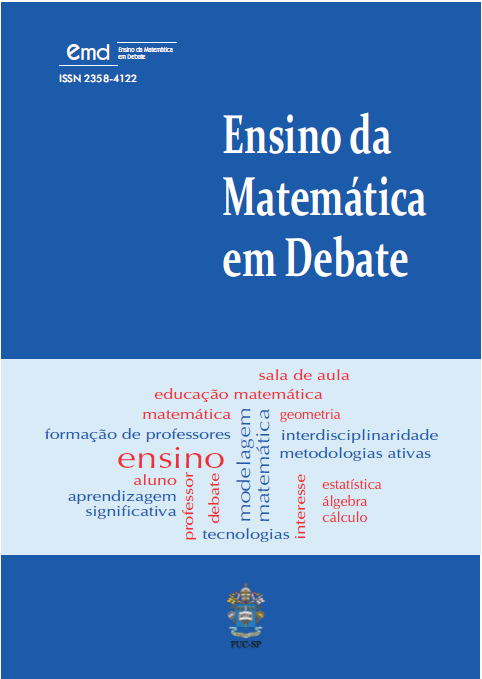Interactive Mathematics
Keywords:
Math Teaching, Teachers’ Education, Mathematical Knowledge, Teaching ProjectsAbstract
Mathematics is a dynamic science, present since the beginning of human history, used to solve problems and develop planning strategies. Therefore, it is born from man's needs, a continuous creation, always in movement. This reflection, however, is not common and what is perceived is a problem associated with the ways in which subjects – students and the general community – conceive mathematics, associated with a science that is not very accessible and, when accessible, as a privilege of “brilliant minds”. . In this sense, this text aims to present an experience of creating spaces for interaction between subjects, different objects, and mathematical representations, with the aim of demystifying access to this science and providing moments of rapprochement and promotion of interest and curiosity in mathematics. The initial milestone was through a teaching, research and extension project developed in 2022 by students and teachers of the Mathematics Degree course at the Instituto Federal Catarinense – IFC Campus Concórdia. The project encompassed the study and selection of different objects and representations that were strategically organized in spaces with high circulation in the institution and outside, offering the possibility for the public to interact with the objects/representations. “Totems” were organized, containing freely accessible informational materials and interaction objects. In addition to physical interaction, a virtual space was created on a social network to reach a greater number of subjects and democratize access to the knowledge covered. Initially, the totems were located in the spaces of Campus Concórdia and, later, in a school and in the public space of a municipal book fair. Observations from scholarship students, materialized in written form, were considered in collecting information about the effects of the project on the subjects. In the teaching dimension, the interaction of a significant number of subjects with objects results, raising the capacity for mental and logical-mathematical organization. Within the scope of extension, the articulation between IFC, its students and teachers and the external community. In the research, observations about the effects that the objects brought/provided, from the point of view of students, students and other subjects who accessed them. The final reflection suggests that subjects have difficulties in relating mathematical knowledge to objects of representation, associating mathematics with abstract and uninteresting ideas, with numbers and incipient algorithmic representations of meaning. Therefore, actions that show practical, playful and interesting aspects of mathematics become important catalysts for demystifying beliefs about the inaccessibility of this science to different subjects in society.
References
BECKER, F. Construção do conhecimento matemático: natureza, transmissão e gênese. Bolema: Rio Claro, v. 33, n. 65, 2019.
BOGDAN, R.; BIKLEN, S. Investigação qualitativa em educação: uma introdução à teoria e aos métodos. Porto: Editora Porto. 1994.
GRANDO, C. M. O concreto, o abstrato e o formal no discurso e na ação pedagógica dos acadêmicos de prática de ensino em Matemática da UNOESC - Chapecó. Dissertação de Mestrado PPGE/CED. Universidade Federal de Santa Catarina. Florianópolis, 2000.
LÜDKE, M. ANDRE, M.E.D.A. Pesquisa em educação: abordagens qualitativas. Rio de Janeiro, E.P.U. 2ºed. 2013.
MAIA, L. S. L. O que há de concreto no Ensino da Matemática? ZETETIKÉ: Campinas, v. 9, n. 15/16, 2001.
MORAES, R. GALIAZZI, M.C. Análise Textual Discursiva: processo reconstrutivo de múltiplas faces. Ciências & Educação: Bauru, v. 12, n. 1, 2006.
PATTON, M. Qualitative Evaluation Methods. Sage Publications, Beverly Hills, 1980.
ROCHA, L. A. S. POFFAL, C. A. MENEGHETTI, C. S. Estudando funções quadráticas com auxílio de softwares. In: Coleção Cadernos de Atividades de Matemática – Práticas Alternativas de Ensino de Matemática. Rio Grande: Editora FURG. v. 1, 2017.
ROQUE, L. SILVA, F. R. D. A matemática e o jogo como influência no rendimento escolar. In: Os desafios da escola pública paranaense (Cadernos PDE). Curitiba: Secretaria do Estado da Educação. v. 1, 2014.
SILVEIRA, M. R. A. “Matemática é Difícil”: um sentido pré-construído evidenciado na fala dos alunos. Emanped: GT19 – Grupo de Trabalho 19 Educação Matemática. Universidade Federal do Rio de Janeiro, 2002. Acesso em 03/12/2021. Disponível em: http://www.ufrrj.br/emanped/paginas/conteudo_producoes/docs_25/matematica.pdf
SMOLE, K. S. DINIZ, M. I. MILANI, E. Jogos de matemática do 6° ao 9° ano. Cadernos do Mathema. Porto Alegre: Artmed, 2007.
SOARES, L. H. RÊGO, R. G. A dialética entre o concreto e o abstrato na construção de conceitos matemáticos. In: ENCONTRO PARAIBANO DE EDUCAÇÃO MATEMÁTICA, 9. 2016. Campina Grande. Anais Eletrônicos do IX Encontro Paraibano de Educação Matemática. Campina Grande, 2016. Disponível em https://editorarealize.com.br/edicao/detalhes/anais-ix-epbem. Acesso em 27 de julho de 2023.
TENÓRIO, R. M. Aprendendo pelas raízes: alguns caminhos da matemática na história. Salvador: Centro Editorial e Didático da UFBA, 1995.
Downloads
Published
How to Cite
Issue
Section
License
Copyright (c) 2023 Ensino da Matemática em Debate

This work is licensed under a Creative Commons Attribution-NonCommercial 4.0 International License.

Este obra está licenciado com uma Licença Creative Commons Atribuição 4.0 Internacional.






